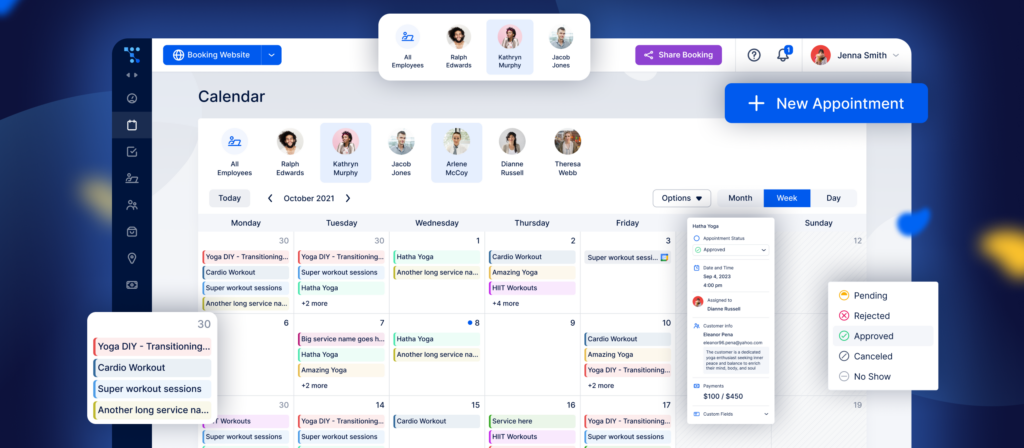From one-on-one coaching that fosters individual growth to innovative online platforms breaking geographical barriers, we’ll explore different coaching business models and show you real-life examples.
Making money by coaching is the dream of many, but it is not as simple as it sounds. For starters, you need to do more than teaching during billable hours, just so that you can clean up the costs and come to point 0. Also, a new coaching business is a one-man show, and that’s where the trouble begins.
The coaching business model is foremost based on the services you provide. If you think of this as the center of the puzzle, the other pieces should help you create and capture value. No matter if you’re a seasoned coach or just beginning, we’ll help you get a clear picture of which coaching business model is the right fit for you.
How to Develop the Perfect Coaching Business Model?
Luckily, there are many ready and profitable online coaching business models to put into practice. With them, you will always strive ahead and involve more and more people. Interestingly enough, you will earn more by doing less.
Not sure how? This is exactly why we prepared this post.
Proposing value
You can’t deliver anything before you’ve defined your value proposition. This means defining the expectations, both yours and those of your clients.
Most of this task is done informally, but there is still plenty left to warm up the chair and think about how to preserve value over time.
The key step is to promise the right solutions:
- Who is your audience? Where can you find them? What does your dream client look like?
- What are the problems you are trying to solve?
- What do you expect to achieve after your sessions?
- Which services/products will you offer to get clients where you want them to be?
Creating value
Let’s assume you have enough experience already, and alongside a client base that trusts you. At this stage, you can already design courses and programs that are effective.
Your promises can be backed up and guaranteed by satisfied clients, and there is not much left to do to bring new people on board.
Be those new or old programs, settle for nothing else than top quality. Help people, as this is the main reason why you are running a coaching business. The money is only the bonus that comes along.
Wrap up the coaching business model upfront, and decide in which niche you are going to operate. Be realistic with your expectations, and make things simple for clients. Of course, they won’t be able to see what is in for them right away, but this is why they will get attractive offers.
Delivering value
Delivery is another essential part of your online coaching business. You need to find the most efficient way to target your audiences and make your offer visible. Before you go for it, answer these questions:
- Do you run an online coaching business, or also offer offline and hybrid solutions?
- Where are the clients located? Can you reach them on social media, with podcasts, or in person?
- What can you do to bring the offer closer to them and their preferences? What do they stand for?
Capturing value
What was your reason to start a coaching business? Did you get what you wanted out of your life coaching business model?
Helping people is the first and most noble reason, but you should also consider the following things:
- You are widely liked.
- Your impact matters.
- You are doing what you like.
- You are making a difference.
As you see, there is plenty to love about your coaching business next to the revenue streams. These things need to get along if you want a successful coaching business model, and there is no way around it.
What Are the Most Popular Coaching Business Models?
The next step will be to look at a particular online coaching business model and see how it can help you. Best practices teach you how to optimize your client base and push your profits upward.
Coaching clients, the same as any other business can be based on different business models. The choice of an adequate coaching business model will influence each aspect of your business. Among them, are its reputation and monetization. The common stream is that they all let you help more people and make progress.
These are the seven coaching business models we will discuss:
One-on-one and individual coaching
Almost every coaching business model started as a one-on-one session. Most of them still offer this service as the core of their work. Coaching clients individually is easy to plan and organize. It also requires the smallest investment. For the money, it lets you learn directly from interesting clients and gather experience.
Choose this coaching business model if you want to dedicate attention to each client, and work with them step-by-step. You will be limited to how many clients you can handle, but this will also affect the price per session and keep you busy.
Systemize the approach and get to know your clients. You will be able to predict their needs and teams and prepare for the joint journey. The time will come when you will be ready to coach groups, so don’t rush into it.
Group coaching
Once your personalized coaching business gets too big for its bridges, use the experience and move to groups. You will already know what clients expect and you will not be supposed to reinvent the wheel. People know who you are, they trust you, and you can easily bring the community on board.
Your selling advantage is that you offer the services at a fraction of the price now, not the other way around. And, let’s not forget the bottom line: your coaching business will now help many more people than before.
These sessions can not be as personalized as you’d want them to be, but you can still help clients in many unique ways. Make the audience excited and provoke a conversation. The wisdom of your crowd may surprise you.
The downside, however, is the earning limitations. If you want to grow rather than simply stay in business, you need to sell at least 20 tickets a month. What can help here is lead generation software with good conversion capabilities, so keep the idea on the radar.
Career coaching
Career coaching is also an excellent model for a coaching business.
Check this value proposition, for example:
‘I lead ambitious CXOs in Los Angeles towards promotions with my online learning modules and group coaching program’. The creation and delivery of value are different than with health coaching, for example. The reason is simple: you target different clients with different lifestyles.
Some key activities here you can consider are discovery calls, workshops, career health checks, and online classes. Your main resources could be of all sorts. Examples include attractive packages for group coaching, market estimation worksheets, eBooks, etc.
You would operate on channels such as Forbes, LinkedIn, Xing, Glassdoor, and so on. Your main tech tool would be dedicated to online learning.
Coaching courses
Who is better to teach the coach to coach, than the coach? You’ve now run a successful group training session, so why not turn that into a recurring activity? You have customer testimonials and social proof that keep you in the loop. The coaching business will produce just as much profit as you expected.
This coaching business model is perfect in many different ways. With an online coaching business, you can target learners all around the globe. You can even do your work without necessarily leaving the office.
Your coaching business can also be based on self-learning programs that don’t involve you all the time, but which bring money your way 24/7.
You can launch large online coaching business sessions twice per year, and the interest will be even bigger.
Thinking about where to promote your work? The answer is – everywhere. Use social media to reach as many people as you can, such as Instagram, LinkedIn, YouTube, Facebook, Twitter, and even TikTok. Get involved on online coaching platforms and build connections.
Gain social proof by enabling direct contact with the customers, or offering them videos and podcasts. They will appreciate it!
The Perfect Scheduling Software for All Coaching Business Models
When it comes to managing schedules and demands of coaching across various business models, there’s one clear solution: Trafft.
As a versatile and intuitive coaching scheduling software, Trafft empowers you to streamline your operations and elevate your client experience to new heights. Whether you’re facilitating one-on-one sessions, group workshops, or organizing retreats, Trafft offers the flexibility and functionality to suit your needs.
With Trafft, scheduling becomes effortless and efficient, allowing you to focus your energy on what truly matters: guiding and inspiring your clients.
Its user-friendly interface and customizable features make it easy to adapt to any coaching model, ensuring seamless coordination between coaches and clients. From managing multiple calendars to automating reminders and confirmations, Trafft simplifies every aspect of scheduling, saving time and reducing administrative burdens.
But what truly sets Trafft apart is its commitment to innovation and customer satisfaction. Constantly evolving to meet the evolving needs of the coaching industry, Trafft offers unparalleled support and reliability, allowing you to scale your coaching businesses with confidence.
What else do you get from using Trafft?
Flexible scheduling
Trafft allows you to set up flexible scheduling parameters to accommodate various coaching models, whether it’s one-on-one sessions, group appointments, or retreats.
Easy calendar management
You can manage multiple calendars in one place, avoiding double bookings and ensuring optimal time management.
Automated reminders
Trafft sends automated reminders and notifications to clients, reducing no-shows and ensuring smooth communication throughout the coaching process.
Customizable booking forms
Coaches can create customizable booking forms tailored to your specific coaching services and client needs, collecting relevant information upfront for a more personalized experience.
Integrations
Trafft seamlessly integrates with popular tools and platforms such as Zoom, Google Meet, Google Calendar, and Mailchimp, simplifying workflows and enhancing productivity. Plus, it integrates with various payment processing tools for easy upfront payment collection.
Analytics and reporting
You can access insightful analytics and reporting features to track bookings, monitor client engagement, and make data-driven decisions to optimize your coaching practice.
Scalability and growth opportunities
With its scalable features and customizable options, Trafft enables you to grow your businesses and expand your offerings without sacrificing efficiency or quality of service.
Don’t let scheduling challenges hinder your coaching success – explore Trafft demos, check out Trafft’s pricing plans, and unlock the full potential of your coaching business, today.
Sign up immediately – it’s free for up to 5 members, forever.
The membership model
Those of you interested in the group online coaching business should consider a membership program. This way, you can collect monthly membership payments even if your clients don’t attend all the sessions you prepare.
To be successful with this, you need to strike the right balance between scalability and value. If the customer database is not large enough, you may end up losing money.
Here are some hints that can keep you on track:
- Replace the individual sessions with regular online webinars for paying members
- Limit communication to Q&A sections and group forums to make use of your crowd’s wisdom. Your posts may already provide the answer your clients need.
- Don’t send content individually. Instead, create an automated email list and send things to specific groups, depending on their interest. You can share informative content, learning, and technical content, or even upsell here and there.
We recommend this approach to any coaching business that has already adopted an online coaching business model. The business ought to be well-known and even better organized, and have some know-how with group training.
The hybrid coaching business model
The hybrid model is practically a must nowadays. It brings together the online coaching business model with the in-person one. If you also have remote programs for coaching clients, look no further.
We share the prevailing opinion that the hybrid model will become compulsory for any business. It is the perfect development train for online coaching businesses. Better yet, it works for groups just as fine as it does for individuals.
It is also well suited for professionals who’ve just started with online coaching, regardless of their niche.
If this is something that comes into question for you, think of the following:
How do you know that your clients are successful? What can you do to improve your effectiveness?
How will you manage the growing number of clients? What can you do to improve your efficiency?
How can you boost the perceived value of your offer? How can you earn more while investing the same (or less) time?
Corporate coaching
There aren’t many corporate coaches out there and for a good reason. The job is very demanding, and only even possible with years of experience and networking.
If you’ve managed to establish yourself on the market, however, you can do plenty with it. We are talking six figures per deal for professional trainers.
Corporate coaches have specific preferences. They often deal with multi-functional and complex teams. They need significantly more time to plan and execute a project and are almost completely dependent on reviews and referrals.
Retreats as coaching business mode
Hosting retreats or intensive workshops is another coaching business model. This allows for a deep dive into specific topics and creates a more immersive experience for clients.
These events typically involve a concentrated period of focused coaching, often set in inspiring locations conducive to relaxation and reflection. By stepping away from the routine of daily life, participants can fully engage with the coaching process and deeply explore specific topics or skills.
Additional Services Alongside Your Coaching Business Model
Let’s assume you are a fitness and wellness coach, and you are trying to keep people healthy and in good shape. The business model is excellent as it is, but it takes you straight along in their journey of transformation. The more you provide, the more clients expect from you.
If you intend to gain control and identify further earning possibilities, enrich the offer with more services.
You could, for instance, sign regular no-shows in for more training, or offer individual sessions for tracking progress.
You can even upsell healthy products you want to promote.
Affiliate programs
Let’s face it: There will be clients working with you for years. Then, they will simply disappear because their ‘second best’ coach did something better. While you can’t avoid this all the time, some tricks can help you retain your customers. We learned these tricks from the best celebrity coaches.
For starters, don’t look at competition as something negative. You can involve customers with affiliate programs that collect passive income even when they are not around.
Affiliate marketing refers to promoting products you want your audience to use and earning up to 50% commission on each product sold.
Note, however, that this is a slippery slide for your reputation, and can easily cause mistrust if the products are not good.
Before you jump on board, do some research and perhaps test the products yourself. This is the best way to retain your customers.
The prospecting and marketing model
In case you don’t know what it is, ‘a tripwire’ is the trick marketers use to get closer to their prospects before even selling them the core product. The business model works like a charm!
Technically, the ‘tripwire’ would be a very insignificant offer (a $5 coupon for the next session) if they subscribe to a newsletter. At this point, the relationship between the buyer and the seller is already there. The buyer may never buy the products you are promoting, but he also may. That is a risk we’d be willing to take!
First things first, make offers that are small and affordable. You don’t want to take your budget south before you’ve even launched your coaching business. Customers will get interested in what you do and grow to trust you over time. It takes a while, but the line is straight: they come to your website, and in most cases they buy.
If you choose the online coaching model, this model is as good as compulsory for you. You can, for instance, ask prospects to subscribe for a free trial, and only then offer the complete membership. The element of fear will then be gone.
FAQs About the Coaching Business Model
1. What is the coaching business model?
Giving clients who want to realize their goals and aspirations assistance, accountability, and direction is a key component of the coaching business model.
Executive coaching, business coaching, life coaching, career coaching, and health coaching are just a few of the many coaching types and services available today. Coaches frequently charge a fee for their services and can work individually or in groups with clients.
2. How can coaching be a profitable business?
By building a strong reputation for offering top-notch coaching services, identifying a specific niche and target market, and pricing services fairly, coaching may be a successful business.
Offering courses, books, and other goods that complement their coaching services is another way successful coaches exploit their experience.
3. What kind of coaching services are in high demand?
Executive coaching, leadership coaching, corporate coaching, career coaching, and personal development counseling are all in high demand. As more people look to enhance their physical and emotional well-being, health coaching and wellness coaching are also growing in popularity.
4. How do I establish credibility as a coach?
It’s crucial to have official coaching training and certification, as well as experience in your chosen specialty, to build credibility as a coach. Credibility can also be established by developing a strong online presence across social media, a website, and a blog. Finally, getting customer endorsements and reviews can show how beneficial your coaching services are.
5. How can I find clients for my coaching business?
A tailored marketing approach that concentrates on your specialization and target market is necessary to attract clients for your coaching business. This can involve starting a website and blog, developing a social media following, going to networking gatherings, and collaborating with other experts or companies in your sector.
6. What are the key components of a successful coaching business model?
Having a distinct niche and target market, establishing credibility and expertise, developing successful coaching programs, pricing services appropriately, offering top-notch customer service, and constantly improving your coaching abilities are all essential elements of a successful coaching business.
7. How much should I charge for my coaching services?
Depending on the coach’s specialization, amount of expertise, and services provided, the cost of coaching services may change. Coaches typically bill by the hour or by the package.
While package fees might range from $500 to $10,000 or more, hourly rates are typically between $50 and $500. It’s critical to accurately price services based on the value given to the client.
8. How do I structure my coaching programs for maximum impact?
It is crucial to comprehend your client’s goals, develop a personalized coaching plan, establish clear expectations and accountability, offer continuing support and feedback, and monitor progress and achievements in order to organize coaching programs for optimal impact.
The effectiveness of coaching programs can be increased by incorporating resources like assessments, worksheets, and homework.
9. How can I differentiate myself from other coaches in the market?
It’s critical to have a distinct niche and target market, to build experience and credibility in your field of expertise, and to create a particular coaching style or technique if you want to stand out from other coaches in the market.
Offering extra services or goods, such as online classes or workshops, can also help you stand out.
10. What are some common challenges faced by coaches in building their business?
Finding clients, establishing reputation and competence, pricing services appropriately, managing time and resources efficiently, and maintaining work-life balance are all difficulties that coaches frequently run into when trying to grow their businesses. Also, there can be a lot of competition in the coaching sector, so it’s critical to stand out and advance your coaching abilities constantly.
Conclusion on Successful Coaching Business Models
As you saw, there are many business models and possibilities to use for your coaching business. Some let you organize group coaching events, others let you specialize in individual training.
The bottom line is the same: you help people and you earn in the long run.
Value can be created in many different ways, so don’t worry about it. This experience should be interesting and rewarding for you, not something you do because you must. The business model should be entirely based on your preferences.
Hungry for more?
We have just what you need! Dive into additional resources about coaching and gain more knowledge:
- The Best Coaching Questions You Could Ask Your Clients
- How to Create an Efficient Coaching Schedule
- Types of Coaching: The Only Guide You’ll Ever Need
- The Best Coaching Apps to Take Your Business to The Next Level
- Coaching Scheduling Software: Top 7 Picks & In-Depth Reviews




